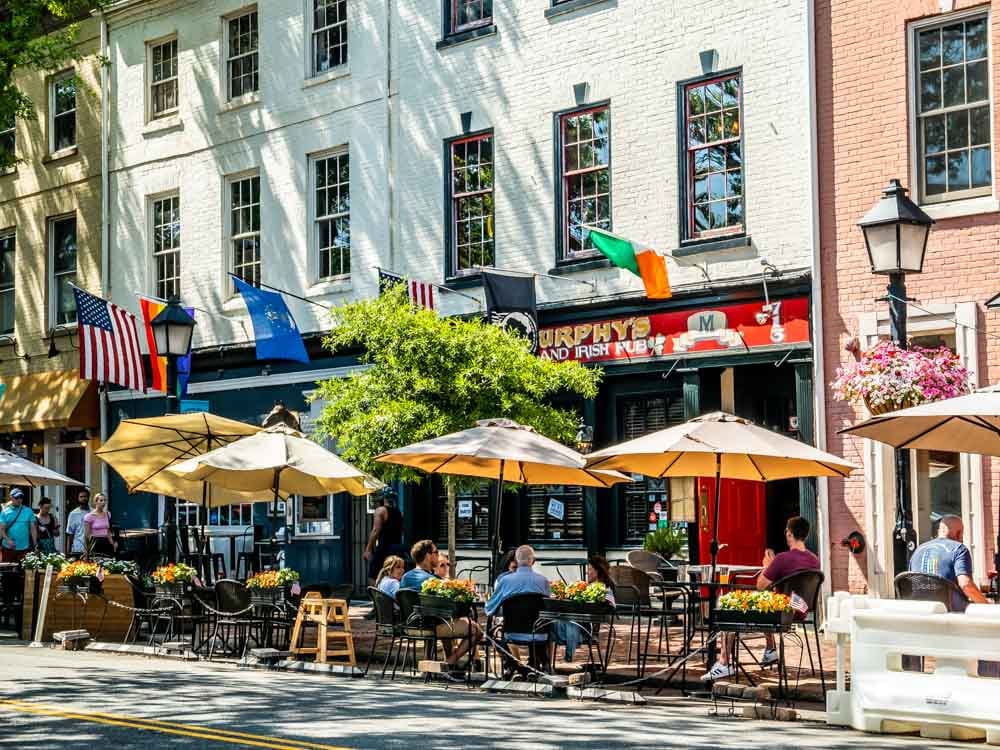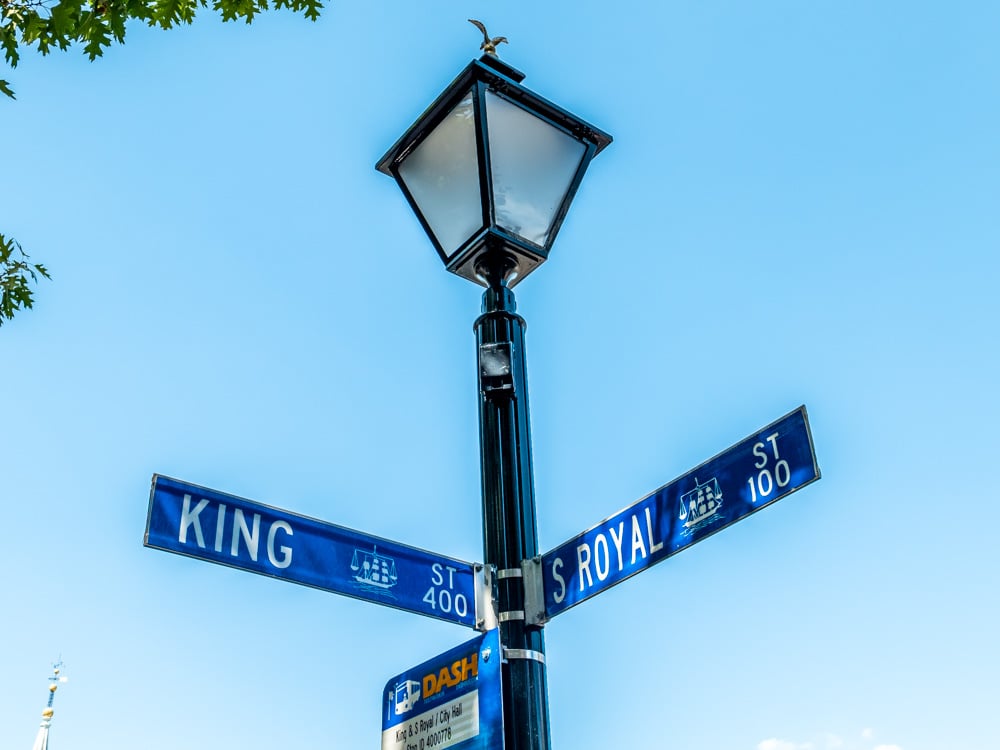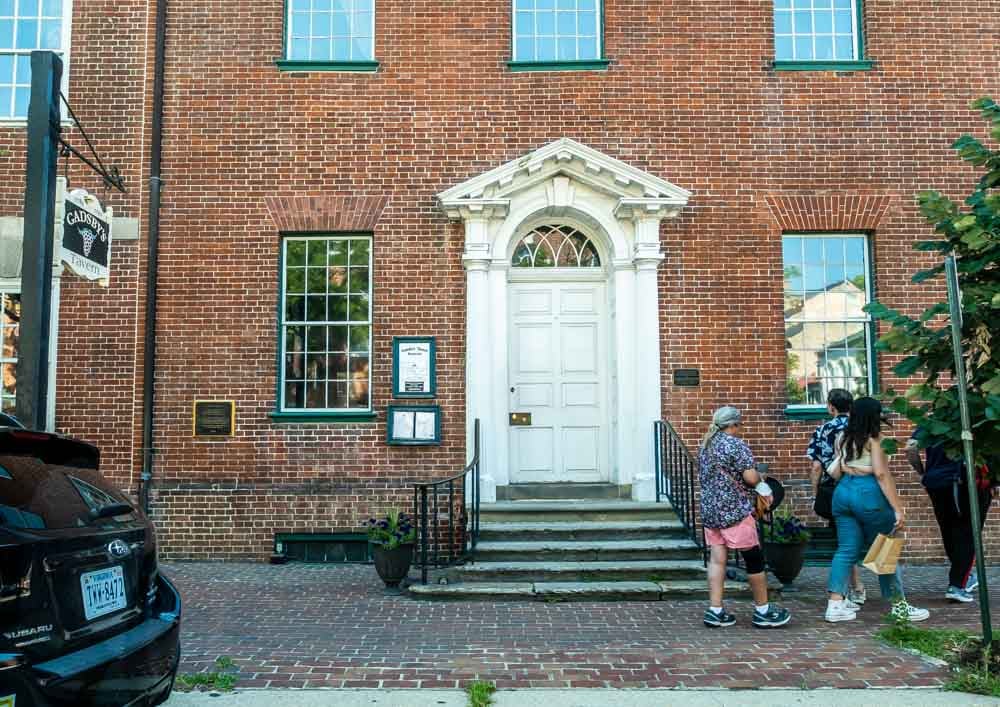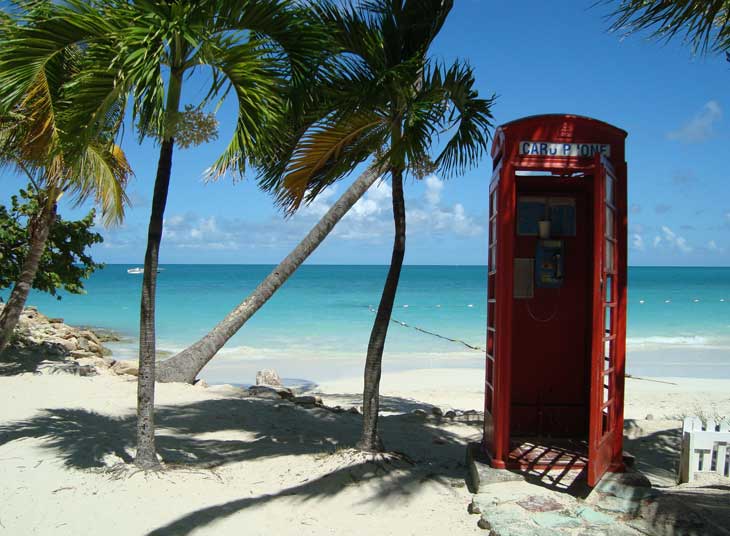Alexandria, Virginia is situated just 7 miles south of Washington, DC. But when you explore Old Town Alexandria you will see such a contrast, far removed from the more modern metropolis of the nation’s capital.
This historic area goes back to 1749 when it was founded, and walking through the place you can explore further back in the history of the USA than in a lot of other places.
It has a history that spans through being a Tobacco Colony, one of the largest ports in the country, and the slave trade as well as being George Washington’s local town. He was involved in Alexandria in more ways than one.
Today it has kept its historical architectural and colourful charm and is also bustling with shops, boutiques, restaurants and bars. It’s main population are those who work for the federal government or who are within a commute of major federal hubs.

I also wanted to explore the infamous Spite Houses I had heard of and find out about these tiny, thin abodes.
It was time to explore more in the sunshine. You know me, I cannot explore without trying to learn about a place’s history too.
The Founding
For what became Alexandria we need to go back to 1669 when a patent was granted, on the authority of King Charles II, for 120 people to move into this area in the Colony of Virginia. This land soon then became the property of a Scotsman named John Alexander.
The land became huge for tobacco plantations all along the Potomac River, and by the 18th century there was lots of grain being grown inland as well. There was a need for a better tobacco warehouse and a place to use for shipping.

It was in 1749 a petition was looked at to create a town and tobacco warehouse in a new town by Hunters Creek on the Potomac River.
This land, however, encroached into what was now Philip Alexander’s land so they appeased him by naming the new town Alexandria in honour of his family name.
Alexandria was founded in 1749 but did not become incorporated until 1779.

The area was surveyed for the town by a 17 year old George Washington who, at this time, was an up and coming surveyor.
Major Port
From its establishment, Alexandria thrived as a major port. International ships came here and goods were exported up and down the coast as well around the world.

Alas, a lot of this trade was achieved with the use of slaves as labour. In fact, Alexandria became one of the biggest centres of the slave trade, providing a port for slave transportation to the southern states.
There was a huge population of slaves in the town, as well as freedmen, working all the way up to the Civil War. It is a sad twist that without all this enslaved, cheap labour that the vision for Alexandria would never have worked out.

As I was down by the riverside I tried to imagine the port in its heyday. Today it is a place for people to relax by the river, take cruises and enjoy other leisure activities on the water.
Part of Washington, DC
George Washington influenced the area again in 1791 when the town was incorporated into the District of Columbia to make the 10 mile wide capital city. Along with other places like Arlington, part of Fairfax County, Alexandria seceded from Virginia at this time.
in 1848 it was retroceded back to Virginia. There are many reasons for this. The lack of economic input with the main capitol getting more financial help on the other side of the Potomac River was a huge driver. Plus, with talk of the abolition of slavery in DC there was a fear that trade would suffer greatly.

Civil War
When the Civil War broke out in 1861 the Union very quickly descended on Alexandria which was part of Virginia, a confederate state.
It became a huge transportation port for the Union in terms of not just supplies but moving soldiers and receiving the wounded.
At the takeover there is one story that became symbolic for both sides. On landing, a Union Colonel called Elmer E. Ellsworth went up a hotel building to take down a Confederate flag that could be seen from over in the White House. He was shot by the hotel owner James W. Jackson. This man was then subsequently shot dead by one of Ellsworth’s men.
From then on during the war, both Ellsworth and Jackson were treated as martyrs by their respective sides and many children were named after them.
Alexandria stayed in Union hands throughout the war and it left the town in financial ruin. It also became a destination for many freed slaves. They came in masses to Alexandria. By 1863 the population had more than doubled. Many now ‘contraband’ slaves were working for the Union Army.
The 15th amendment paved the way to help this population proper representation in the area too.

Today
Today you can see Alexandria in all its historic glory. From buildings from its small beginnings, through the highs of the major port town to how it has grown beyond the Old Town into a more sprawling, bustling locale.
It does keep that old small town charm that you don’t get everywhere. Some roads are still paved with cobblestones and the streets are filled with the colour of houses built through the times. It also has a vibe that feels calm yet cheerful.
Spite Houses
Alexandria is home to 4 affectionately named Spite Houses. The most famous of which is Hollensbury Spite House, known as the ‘skinniest house in the United States. It is situated on Queen Street.
It is just 7 feet wide and 25 feet deep.

Alexandria was built over time, and thus narrow alleyways appeared between houses. A certain Mr John Hollensbury, who owned the house next to one of these alleyways was said to be sick of loiterers in the alley and wagon ruts damaging his side wall. So he built a house in the gap, out of spite, in 1830.
There are other takes passed down through time that it was to separate him from the neighbour he had fallen out with, or that it was a gift for his daughter to live in.

When I passed the home, I was indeed immediately struck at how narrow it was, but also how it had been built and kept as a great, unique residence.
There are 3 other spite houses in Alexandria and I did find one of them too. These other ones are more likely to have been born out of making good use of a little land between houses. But Hollensby created the name of spite.

The Street Names
As you walk around the real centre and shopping area, you start to notice the names of the streets.
Street names that go back to their colonial beginnings in 1749. When Alexandria was established there were 10 streets and thus started to be named after royalty.

There are streets named King, Queen, Prince, Princess, Duke, for example. There is also a Water Street that was once by the shoreline, plus an Oronoco Street.
Oronoco Street was named after a type of tobacco that was stored in a Warehouse near there at what was once Oronoco Creek by the river.

As you come away from the original Old Town you see the passage of time. Streets with names like Washington, Pitt, Wolfe and Asaph. All people who supported the colonial cause or English gentleman sympathetic to it.
Gadsby’s Tavern
One of the historical buildings to visit is on North Royal Street, called Gadsby’s Tavern. Today it is a restaurant and museum.
It is a complex made up of what was a tavern and a hotel dating from 1785 and 1792 respectively.

John Gadsby who ran the buildings from 1796 to 1808 gave rise to the name but it is all the possible conversations and decisions that were made inside that lead to the extra history.
The republic was young, but the tavern was a hub for famous and political guests. George and Martha Washington frequented the tavern often, almost like their local. We must remember their home, Mount Vernon is only a short distance away.
Other requenters were Thomas Jefferson, John Adams, James Madison and James Monroe. Together with Washington, you can only guess what decisions and ideas could have been born here!

Never Enough Time
One thing I started to notice as I walked around the Old Town was that there was never going to be enough time to explore everything.
Old Town Alexandria was going to become one of those places that requires frequent visits, and I very much look forward to that. It is interesting, historical, has a slower pace compared to other cities in the US, and has a lot to see and do. It is my kind of place.
Where To Stay In Alexandria
Find below a selection of popular places to stay in Alexandria.








